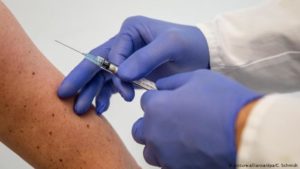
From elderly Cuban Americans in Florida to farmworkers in California, Latinos are facing obstacles to getting the covid-19 vaccine, creating risks for public health as the coronavirus mutates and spreads.
Rigoberto Montesinos, a veteran of the Bay of Pigs invasion in Cuba, was worried about the side effects from the COVID-19 vaccine that he wasn’t going to get it but after two of his friends died from the disease, he decided to get the vaccine. The 82-year-old man couldn’t find doses of the vaccine where he lives in Hialeah, Miami which is about 95% Latino.
Montesinos finally got an appointment in a nearby city, but it was canceled. After struggling for weeks, he finally received the first dose last week. America’s more than 60 million Latinos like other people of color have been disproportionately affected by the virus and many are struggling with issues such as lack of knowledge about the shots, state vaccine websites that don’t have Spanish instructions, ways to find appointments in their communities, and fears they could be targeted for immigration enforcement.
It comes as states, cities, and counties are grappling with how to ensure people of color and other underserved communities are getting the vaccine, with some targeting vulnerable zip codes and working with community groups to sign people up. In Arizona, where language is a barrier for some Latinos and English is the only option on the state website for vaccine appointments, a university researcher is working on an online Spanish language campaign to address vaccine misconceptions.
An AP-NORC poll of U.S. adults in late January showed that about half of Latinos and Black Americans are very worried about themselves and family members being infected with COVID-19. That’s compared with about 4 in 10 white Americans.
About 65% of Latinos said they will get the vaccine when it’s available to them or that they have already received at least one dose. With a tendency for health problems like diabetes, obesity, and hypertension, Latinos are one of the groups at highest risk from COVID-19 in the U.S.
In New York, married physicians Dr. Victor Peralta and Dr. Ingrid Felix- Peralta administered shots last week at a public housing complex through the SOMOS network that provides health care low- income minorities. Dr. Peralta stated, “Latinos make up a large proportion of our front-line workers. They work at supermarkets, restaurants, food industry and they are working during the day so it’s hard to find time to get vaccinated”.
Fear of deportation can also be an issue for Latinos in the U.S. without proper documentation, even though the U.S. Department of Homeland Security says vaccinations sites will be considered off limits for routine enforcement. Along with those fears of deportation, education can also be a problem. Advocates for Guatemalan farmworkers in Lake Worth, Florida, north of Miami, stated that some migrants cannot read or write in any language and most lack a car or driver’s license.

Recent Comments